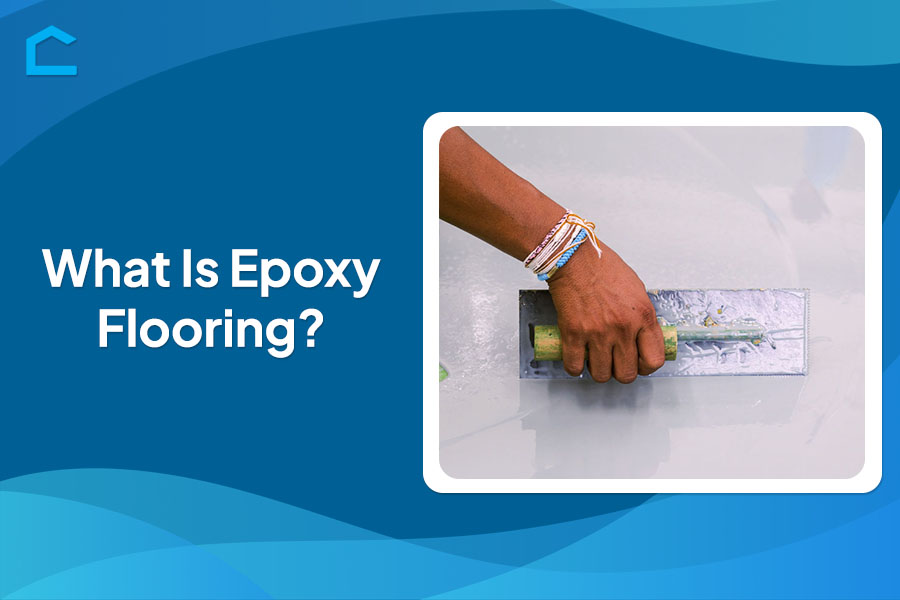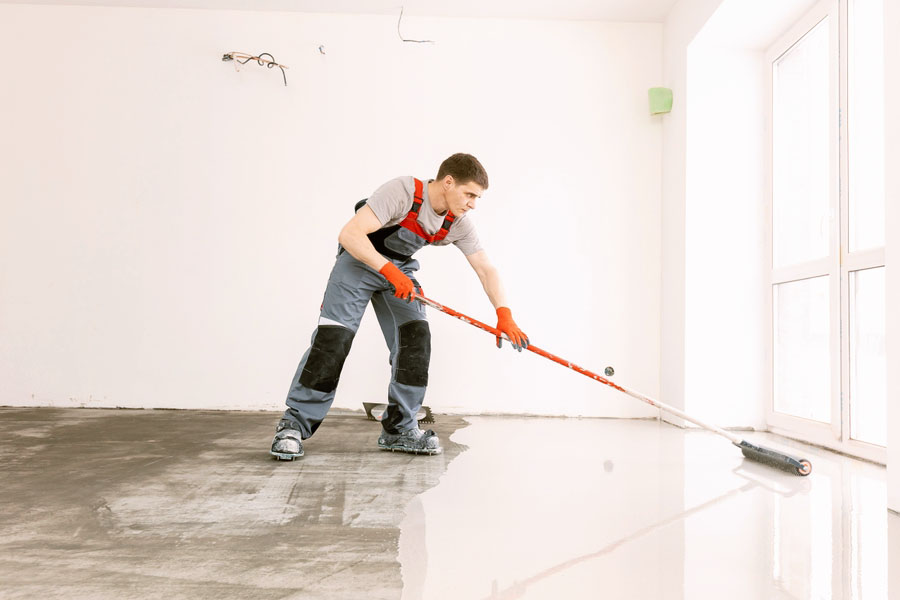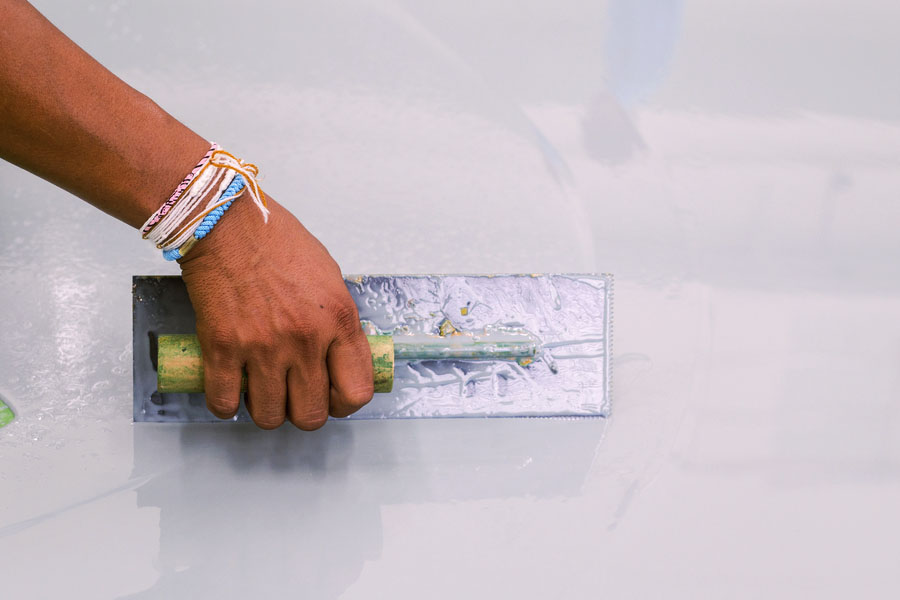What Is Epoxy Flooring?

Epoxy flooring is a unique and versatile choice that offers much more than what meets the eye. This durable and seamless surface has emerged as a captivating option. But what is epoxy flooring?
This article will dive into the composition of epoxy, unveiling its remarkable strength and resilience. We’ll explore the diverse applications where epoxy flooring shines brilliantly, from industrial settings to residential spaces, each showcasing its unique advantages.
You will uncover the secrets behind the installation process, maintenance requirements, and countless design possibilities that epoxy flooring offers. Get ready to be inspired by the seamless and customizable aesthetic that epoxy can bring to any space, transforming ordinary floors into extraordinary masterpieces.

What Is Epoxy Flooring?
Epoxy flooring is a type of durable and long-lasting flooring solution made from epoxy resin. It’s often used in industrial and commercial settings but is also gaining popularity in residential spaces.
Epoxy is applied as a liquid to the floor, which hardens into a tough, seamless surface that can withstand heavy foot traffic, chemicals, and impacts. It comes in various colors and finishes, offering both functionality and aesthetic appeal.
Applications of epoxy flooring
Epoxy flooring finds widespread use across diverse settings due to its durability, chemical resistance, and customizable nature. Among its applications are the following:
- Residential garages: A durable, low-maintenance, and slip-resistant surface ideal for accommodating vehicles and automotive fluids.
- Warehouses and industrial facilities: Appropriate for high-traffic areas and heavy machines because it can withstand large loads, impact, abrasion, and chemical exposure.
- Healthcare facilities: Non-porous and seamless surface prevents bacterial growth, enabling a hygienic environment while resisting chemical disinfectants.
- Commercial kitchens: Resistant to spills, moisture, and harsh cleaning agents while offering customizable designs.
- Automotive showrooms and basements: Durable and aesthetically appealing, with endless design possibilities through incorporated patterns or flakes.
Epoxy’s versatility allows it to adapt to various environments. It provides both functionality and visual appeal across residential, commercial, and industrial applications.
Advantages of Epoxy Flooring
Epoxy flooring offers several key advantages that make it a popular choice for various residential, commercial, and industrial settings. Some of the best advantages are:
Durability and impact resistance
One of the epoxy’s standout features is its exceptional durability. The combination of epoxy resins and hardeners creates an incredibly tough surface that can withstand heavy foot traffic, impacts from dropped objects, and abrasions from machinery. This high durability makes epoxy ideal for areas with substantial wear and tear.
Chemical resistance
The seamless, non-porous nature of epoxy flooring provides superior resistance to chemicals like oils, greases, acids, and other harsh substances. This chemical resistance prevents corrosion and deterioration, making epoxy suitable for facilities exposed to harsh chemicals, such as automotive shops, laboratories, etc.
Aesthetic versatility
Despite its industrial-grade toughness, epoxy flooring offers a range of aesthetic options. It can be tinted with various colors and customized with decorative elements like metallic flakes, quartz granules, or intricate patterns. This versatility allows for unique, visually appealing floors that enhance the overall design.
Low maintenance
Epoxy’s seamless surface makes it easy to clean and maintain. Spills and dirt can be effortlessly wiped away, and its non-porous nature prevents bacteria growth. This makes epoxy a hygienic choice for areas demanding cleanliness, such as healthcare facilities or food processing plants.
With its impressive durability, chemical resistance, aesthetic versatility, and low maintenance requirements, epoxy flooring stands out. It is a practical and attractive solution for diverse applications.
Disadvantages of Epoxy Flooring
While epoxy flooring offers numerous advantages, it’s essential to consider its potential drawbacks. So, what are the disadvantages of epoxy flooring? Some of the disadvantages are:
UV discoloration
Epoxy floors are susceptible to discoloration due to UV exposure from direct sunlight. Over time, the epoxy can turn yellow or become degraded.
The issue is particularly relevant for areas with large windows or skylights. UV-resistant epoxy formulations or window tinting can help mitigate this problem.
Slipperiness concerns
The smooth, non-porous surface of epoxy flooring can become slippery, especially when wet or in high-traffic areas, increasing the risk of slips and falls. Incorporating anti-slip additives or surface treatments during installation can enhance traction and improve safety.

Lengthy installation process
Installing epoxy flooring is a multi-step process involving surface preparation, mixing, and curing time. This can be time-consuming, disrupt operations, and may involve strong odors during the curing process.
Limited repairability
Unlike modular flooring systems, repairing epoxy flooring can be costly and challenging. Damage or wear may require resurfacing entire sections, leading to potential disruptions and expenses.
Initial investment
Epoxy flooring lasts a long time, but installing it can cost more at first than other flooring types. This might matter if you’re watching your budget.
To decide if epoxy flooring is right for you, consider both the advantages and disadvantages. That way, you can make a smart choice that fits your needs and budget.
Installation Process of Epoxy Flooring
The installation involves several key steps:
- Surface preparation: Thoroughly clean, repair, and profile the existing floor for optimal epoxy adhesion.
- Primer application: Apply a specialized primer to enhance bonding between the epoxy and substrate.
- Epoxy coating: Apply the epoxy coating carefully, usually in several layers, until the required thickness is reached.
- Topcoat: Apply a clear protective topcoat to improve durability, chemical resistance, and slip resistance.
For a durable epoxy floor that lasts, it’s vital to have trained professionals perform the installation using the proper techniques. This ensures a seamless finish and high quality.
Considerations for Choosing Epoxy Flooring
Selecting epoxy flooring involves considering factors like environment, traffic levels, aesthetics, and budget. You should assess the space’s conditions, such as moisture exposure and temperature variations, to choose an epoxy that withstands them.
For high-traffic areas, we advise you to prioritize durable coatings, while for aesthetics, explore various colors, patterns, and finishes. Ensure the chosen epoxy offers sufficient abrasion, impact, and chemical resistance, aligning with maintenance preferences.
Moreover, evaluate installation requirements, like downtime and complexity, and balance them with budget constraints to find the best value. By addressing these aspects, you can select an epoxy flooring system that enhances functionality and appearance while staying within budget.

Conclusion
What is epoxy flooring? In retrospect, epoxy flooring is a versatile and durable solution, offering both functionality and aesthetic appeal across diverse settings.
As we unraveled its composition, applications, advantages, and installation process, you uncovered a flooring option that transcended mere utility, transforming ordinary spaces into extraordinary environments. Despite its notable benefits, it was crucial to acknowledge potential drawbacks like UV discoloration, slipperiness concerns, lengthy installation processes, limited repairability, and initial investment costs.
You can make informed decisions by carefully considering these factors alongside environmental conditions, traffic levels, aesthetics, and budget constraints. This ensures that epoxy flooring meets your specific needs while delivering long-lasting performance and visual allure.
